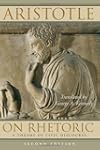Ethos, Pathos, Logos:

2300 years ago, Aristotle wrote down the secret to being a persuasive speaker, the secret which forms the basis for nearly every public speaking book written since then.
Do you know the secret?
If you don’t, you might be wondering what a 2300-year-old theory has to do with public speaking in the year 2013.
In a word — everything!
In this article, you’ll learn what ethos, pathos, and logos are (the secret!), and what every speaker needs to understand about these three pillars of public speaking.
What are Ethos, Pathos, and Logos?
So, what are ethos, pathos, and logos?In simplest terms, they correspond to:
- Ethos: credibility (or character) of the speaker
- Pathos: emotional connection to the audience
- Logos: logical argument
Origins of Ethos, Pathos, Logos — On Rhetoric by Aristotle
Three Pillars of Public Speaking
- Ethos, Pathos, Logos - Introduction
- Ethos - Speaker Credibility
- Pathos - Emotional Connection
- Logos - Logical Argument
Many teachers of communication, speech, and rhetoric consider Aristotle’s On Rhetoric to be a seminal work in the field. Indeed, the editors of The Rhetoric of Western Thought: From the Mediterranean World to the Global Setting call it “the most important single work on persuasion ever written.” It is hard to argue this claim; most advice from modern books can be traced back to Aristotle’s foundations.

Ethos
Before you can convince an audience to accept anything you say, they have to accept you as credible.There are many aspects to building your credibility:
- Does the audience respect you?
- Does the audience believe you are of good character?
- Does the audience believe you are generally trustworthy?
- Does the audience believe you are an authority on this speech topic?
Pathos
Pathos is the quality of a persuasive presentation which appeals to the emotions of the audience.- Do your words evoke feelings of … love? … sympathy? … fear?
- Do your visuals evoke feelings of compassion? … envy?
- Does your characterization of the competition evoke feelings of hate? contempt?
Logos
Logos is synonymous with a logical argument.- Does your message make sense?
- Is your message based on facts, statistics, and evidence?
- Will your call-to-action lead to the desired outcome that you promise?
Which is most important? Ethos? Pathos? or Logos?
Suppose two speakers give speeches about a new corporate restructuring strategy.- The first speaker — a grade nine student — gives a flawless speech pitching strategy A which is both logically sound and stirs emotions.
- The second speaker — a Fortune 500 CEO — gives a boring speech pitching strategy B.
Some suggest that pathos is the most critical of the three. Bert Decker says that people buy on emotion (pathos) and justify with fact (logos).
Aristotle believed that logos should be the most important of the three persuasive appeals. As a philosopher and a master of logical reasoning, he believed that logos should be the only required persuasive appeal. That is, if you demonstrated logos, you should not need either ethos or pathos.
However, Aristotle stated that logos alone is not sufficient. Not only is it not sufficient on its own, but it is no more important than either of the two other pillars. He argued that all three persuasive appeals are necessary.